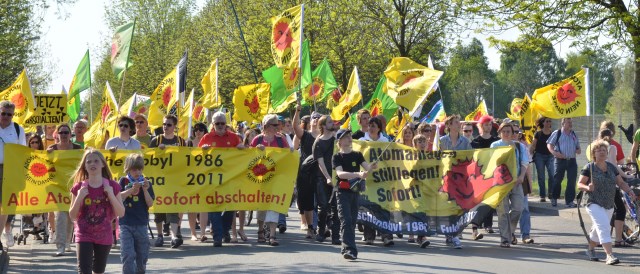Germany’s much-hyped Energiewende is on the defensive. There’s a backlash against it, even though opinion polls show three-quarters of Germans in favor of Germany’s clean energy transition, notes Paul Hockenos.

Resistance to the Energiewende does not come as much from civil society as from big industry. (Photo by Bündnis 90/NRW, CC BY-SA 2.0)
Indeed, the stiffened opposition comes not from the demos but from energy-traditionalists in the political elite, grid operators, the fossil fuel and nuclear lobby, and some sectors of heavy industry. This resistance has crystallized at a critical juncture: With clean energy capacity and output growing rapidly, key policymaking is called for on a range of issues from grids to capacity markets. Nothing major though is likely to happen between now and Germany’s national elections in autumn.
This backlash comes after roughly a year (spring 2011 to spring 2012) when there seemed to be a rock-solid, national consensus around the Energiewende. In the aftermath of the Fukushima disaster in spring 2011, Chancellor Merkel pulled a U-turn on the question of prolonging nuclear power as a “bridge technology,” shutting down one-third of Germany’s nuclear capacity and pledging that the remaining reactors would come off-line over the next 11 years. Moreover, Merkel stated that a transition to renewables, already underway since 2000, would be accelerated to meet targets such as the EU goals and those set by her government in 2010, including Germany’s long-term aim to have 80 percent of its electricity generated by renewables by 2050. A wide range of new measures were proposed – from energy efficiency to grid expansion initiatives – that would speed implementation of the administration’s 2010 Energy Concept.
At the time and for about a year after the turnaround, there appeared to be a wide-ranging, all-party agreement that Germany would lead the way in Europe. Merkel’s Christian Democratic Union (CDU) is a hierarchical party, and even the vocal, pro-nuclear faction in the CDU, closely linked to the fossil fuels lobby, fell grudgingly in line. Likewise, the Christian Democrats’ neo-liberal and pro-nuclear coalition partner, the Free Democrats, appeared cowed, at least for the time being.
Merkel’s epiphany on nuclear power came at a time when the Energiewende was suddenly on everybody’s radar in Germany. The explosion in renewables – in particular PV and onshore wind – had exceeded the wildest expectations of its designers. “In 2000 a competition was opened up to the whole array of renewables,” says Rainer Baake of the Berlin-based think tank Agora Energiewende. “Onshore wind and PV won it.” Renewables were generating 20 percent of Germany’s electricity needs; the clean energy industry employed 380,000 people, many of them in depressed eastern Germany; clean energy co-ops were sprouting up all over the country; and government at all levels was cashing in on tax revenues from the booming industry. The rest of the world had also taken note of Germany’s energy revolution, sending foreign delegations one after another to energy-independent villages like Feldheim in Brandenburg or the energy-progressive college town of Freiburg (I even ran into a North Korean delegation at Feldheim!). Merkel was touted as “the Energiewende chancellor,” and countries across the planet were putting in place feed-in-tariff schemes along the lines of those in Germany.
Since then, Germany’s clean energy transition hasn’t stopped breaking one record after another in terms of zero-carbon electricity production. But the success has spelled out consequences that the Merkel government simply wasn’t prepared for, banking as it originally had been on the prolongation of nuclear power. The government didn’t have a policy agenda in a bottom drawer to address pressing issues like the outdated transmission system, the Cold War-era electricity market, the out-of-date Renewable Energy Sources Act, and other key issues, all of which demanded engagement as a result of the epic shift underway in Germany’s energy system. Since then, the government has thus often looked unsure of itself and hesitant, as well as divided within itself as to the direction it wants to go. This indecision has been exacerbated by the replacement of the green-minded Norbert Röttgen with the less-convinced Peter Altmaier as environment minister.
In this limbo, important aspects of this fragile consensus have eroded over the last year. One exception is the nuclear phaseout: There’s no longer any serious advocate of nuclear power with clout enough to reverse Merkel’s Fukushima U-turn. Rather, the energy hawks, led by the economics minister Philipp Rösler, have pulled out the stops to brake the expansion of renewables, block energy efficiency initiatives, and undermine the EU’s carbon emissions trading scheme.
By Paul Hockenos, journalist and author, “Going Renewable” blog. This article first appeared on the German Council on Foreign Relations’ website.